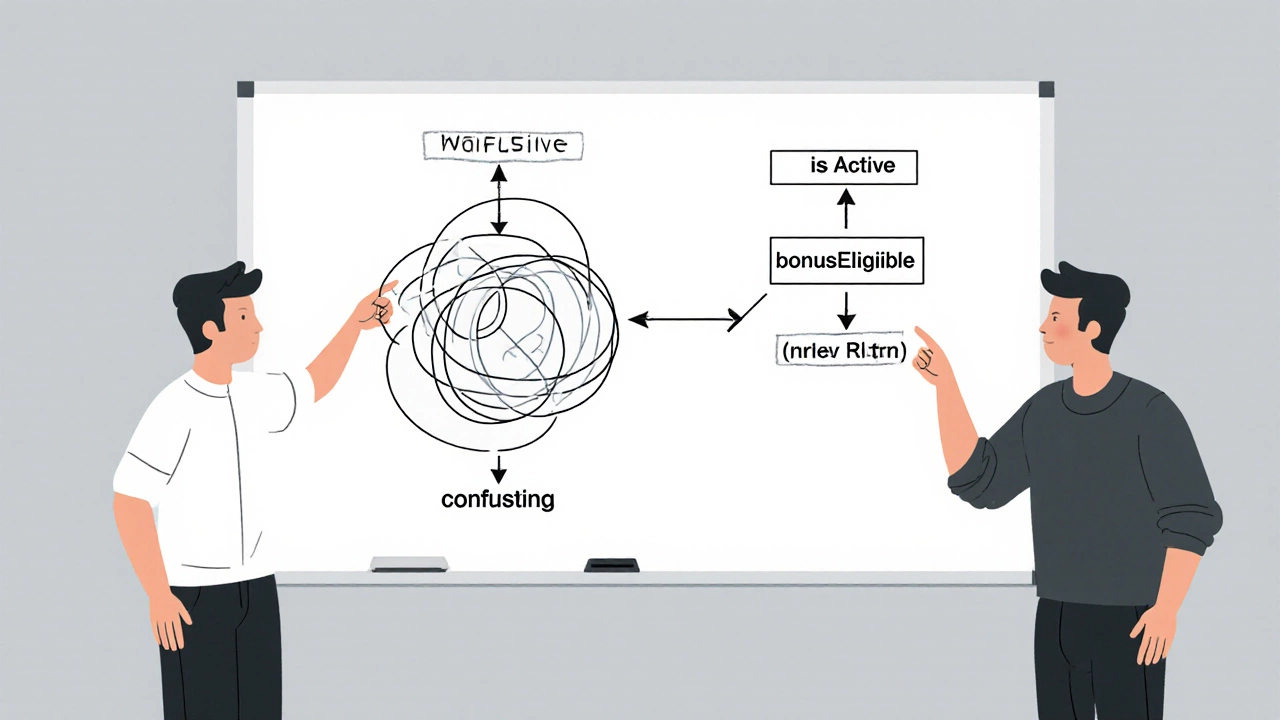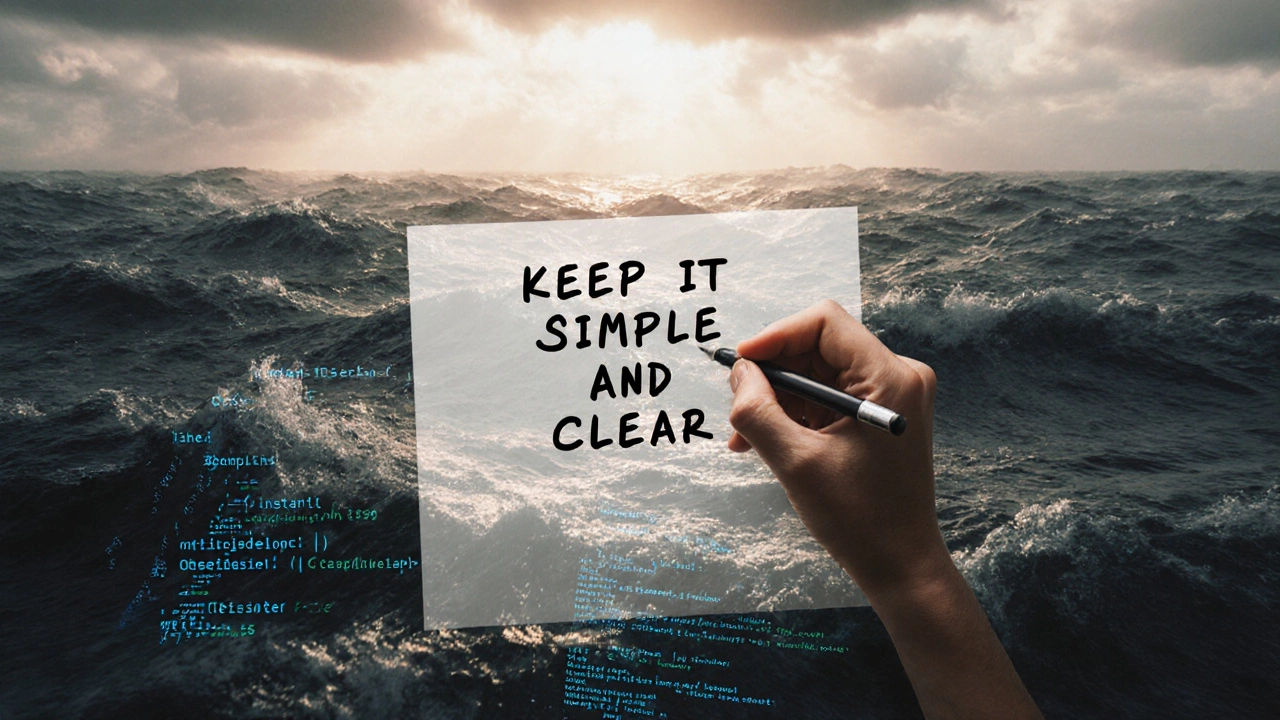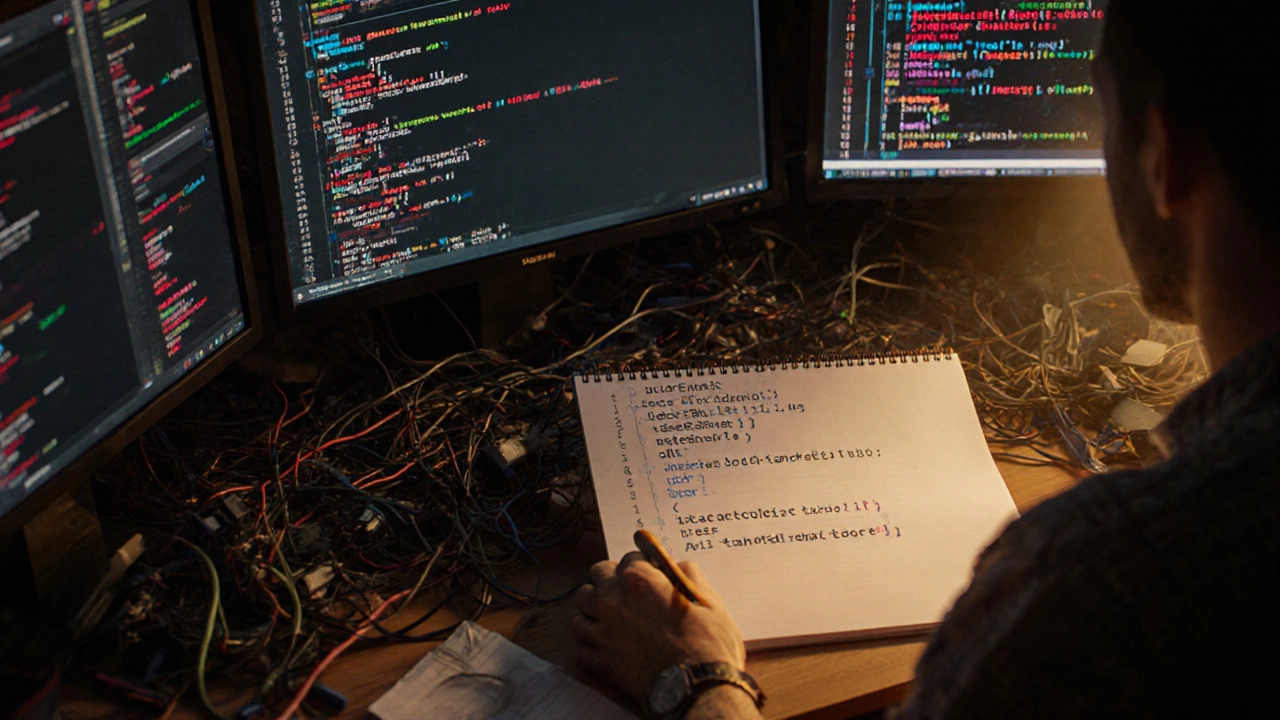Code Simplicity Calculator
Ever stared at a piece of code and thought, Why does this even exist?? You’re not alone. Thousands of developers waste hours untangling messy, overcomplicated scripts just because someone forgot the one rule that matters most: Keep it simple and clear. That’s the golden rule of coding.
It’s not about writing the fanciest algorithm or using the newest framework. It’s not about impressing your boss with clever tricks. It’s about making sure the next person who looks at your code-maybe you in six months-can understand it in under 30 seconds. That’s it.
Why Simplicity Wins Every Time
Complex code doesn’t make you a better programmer. It makes you a bottleneck.
Think about it: companies don’t pay you to write code. They pay you to solve problems. And the fastest way to solve a problem is not by writing more lines, but by writing fewer, clearer ones. A 2023 study by GitHub analyzed over 500,000 open-source pull requests. The ones with the fewest changes and the clearest variable names were merged 40% faster. Why? Because reviewers didn’t have to guess what the code was trying to do.
When code is simple, bugs hide less effectively. Fixes happen quicker. Onboarding new team members becomes less of a nightmare. And when deadlines hit? You’re not scrambling to rewrite half the app because no one remembers how the login system works.
What Does "Simple and Clear" Actually Look Like?
Simple doesn’t mean easy. It means intentional.
Here’s what it looks like in practice:
- Variable names like
userEmailinstead ofueordata1 - Functions that do one thing and do it well-no more than 15 lines
- Comments that explain why, not what (the code already shows the what)
- Consistent formatting: spacing, indentation, naming conventions
- No nested loops inside conditionals inside other loops unless absolutely necessary
Take this example:
// Bad
function calc(x, y, z) {
if (x > 0) {
if (y === true) {
if (z % 2 === 0) {
return x * y + z;
} else {
return x - y;
}
}
}
}Now compare it to this:
// Good
function calculateFinalScore(userPoints, isActive, bonusEligible) {
if (!isActive) return 0;
if (!bonusEligible) return userPoints;
return userPoints + (userPoints * 0.1);
}The second version is shorter, easier to read, and tells you exactly what it does. No guessing. No digging.
Real-World Consequences of Ignoring the Rule
In 2024, a major Australian bank had to shut down its mobile app for 14 hours because a single line of code changed a variable name from accountBalance to bal during a refactoring. No one caught it because the codebase had no consistency. The fix? Rewriting 12,000 lines of code to match the new naming standard.
That wasn’t a bug. That was laziness dressed up as efficiency.
Startups die from this. Enterprises collapse under it. Even the most powerful AI tools can’t fix code that’s too confusing to understand. You can’t train a model on chaos.

How to Build the Habit
Simple code doesn’t happen by accident. You have to train yourself.
- Read other people’s code-especially code that’s been in production for years. Notice what’s easy to follow.
- Write code like you’re explaining it to a 12-year-old. If you can’t describe it in plain English, it’s too complicated.
- Use linters and formatters (like Prettier or Black) to enforce consistency automatically.
- Before pushing code, ask: "Would I understand this if I saw it tomorrow after a weekend off?"
- Refactor ruthlessly. If something feels "off," fix it now, not later.
One developer I know rewrote his entire API endpoint after realizing he’d used 17 different naming styles across 3 files. He spent two hours fixing it. Three weeks later, his team saved 15 hours of debugging time.
Myths About "Smart" Code
There’s a dangerous myth that clever code = good code.
Using obscure one-liners? That’s not clever. It’s showing off.
Writing a custom sorting algorithm when a built-in function exists? That’s not innovation. That’s risk.
Using 10 nested ternary operators to avoid an if-statement? That’s not elegant. That’s a puzzle.
The best code is invisible. You don’t notice it because it just works-and you can read it without thinking.

What Comes After the Golden Rule?
Once you master simplicity, you start seeing patterns. You notice that the most reliable systems aren’t the most complex. They’re the ones with the fewest moving parts.
That’s why companies like Google and Microsoft have internal style guides that ban certain patterns-not because they’re wrong, but because they’re confusing.
And when you work with others? You become the person everyone asks to review their code. Not because you’re the fastest coder. But because you write code that doesn’t make people want to quit.
Final Thought: Code Is for People
Computers don’t care if your code is messy. They’ll run it anyway.
But people do. And you’re not writing code for machines. You’re writing it for other humans. Your teammates. Your future self. The intern who’ll inherit your project.
So next time you sit down to code, ask yourself: Will this make someone’s life easier-or harder?
If the answer isn’t "easier," rewrite it.
Is the golden rule of coding the same for all programming languages?
Yes. Whether you’re writing Python, JavaScript, Java, or Rust, the goal is the same: make your code easy to read and understand. The syntax changes, but the principle doesn’t. A variable named totalPrice is clearer than tp in any language. Clean structure, clear names, and minimal complexity are universal.
Does following the golden rule slow me down as a beginner?
It might feel slower at first. You’ll spend more time choosing names and breaking functions into smaller pieces. But that’s training. Think of it like learning to write essays-drafting clearly takes longer than scribbling, but you get better results and fewer revisions later. After a few weeks, writing clean code becomes automatic-and you’ll actually code faster because you’ll make fewer mistakes.
Can I skip the golden rule if I’m working alone?
No. Even if you’re the only one working on a project, you’ll forget what you wrote in 30 days. That’s human nature. When you come back to fix a bug or add a feature, you’ll be a stranger to your own code. Writing clearly now saves you hours of confusion later. It’s not about who’s reading it-it’s about who needs to understand it.
What if my team doesn’t care about clean code?
Start with your own files. Write clean code even if others don’t. Over time, people will notice. They’ll ask why your bugs are fewer. They’ll copy your style. You don’t need to force it. Just be the example. In most teams, once one person shows how much easier maintenance becomes, the rest follow.
Is there a tool that can help me write cleaner code?
Yes. Use linters like ESLint for JavaScript, Pylint for Python, or RuboCop for Ruby. They catch unclear names, overly long functions, and inconsistent formatting. Pair them with formatters like Prettier or Black to auto-format your code on save. These tools don’t make you a better coder-they just remove the noise so you can focus on clarity.
